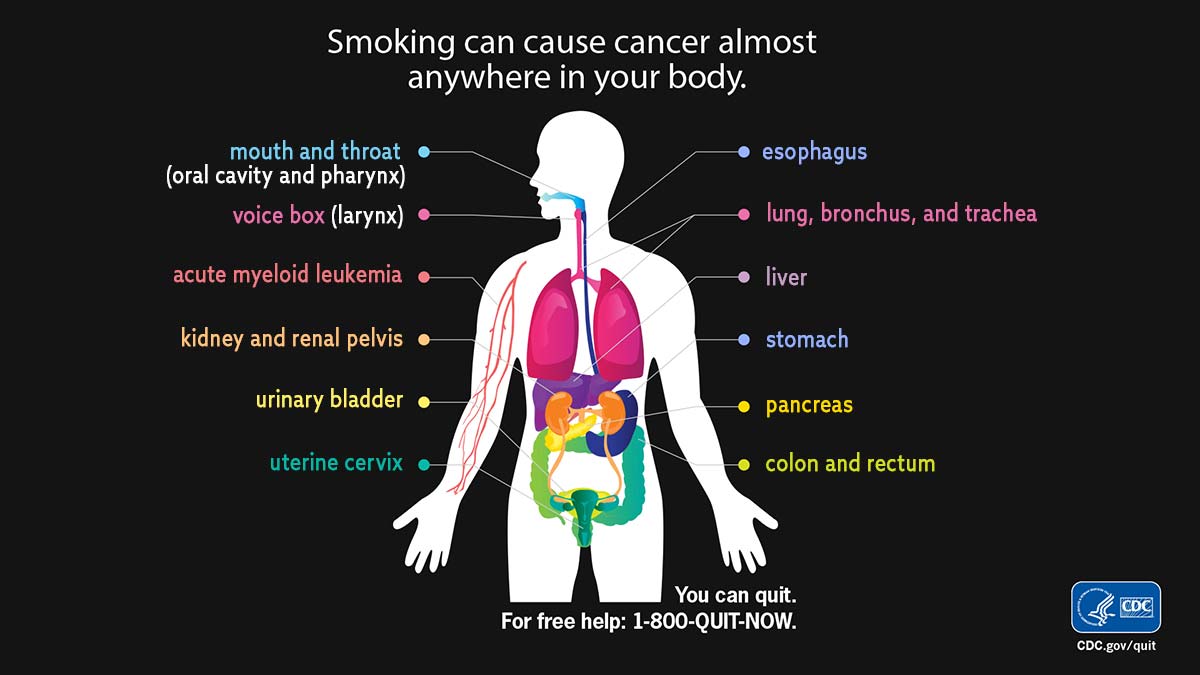At a glance
- Cigarette smoking is a major public health concern, with over 16 million Americans living with a smoking-related disease.
- Smoking and secondhand smoke exposure cause over 480,000 deaths in the U.S. each year.
- Smoking harms nearly every organ of the body and causes many diseases.
- Quitting smoking lowers the risk for early death and of developing smoking-related diseases.
Overview
More than 16 million Americans live with a disease caused by smoking.
- Cigarette smoking is the leading preventable cause of disease, death, and disability in the United States.1
- Cigarette smoking and secondhand smoke exposure cause more than 480,000 deaths each year in the United States. This is nearly one in five deaths.123
Cigarette smoking harms nearly every organ of the body.
Cigarette smoking causes many diseases and reduces the health of people who smoke.12 Smoking also increases health care utilization, health care costs, and absenteeism from work.1
Cigarette smoking causes:1
- Cancer
- Heart disease and stroke
- Lung diseases such as chronic obstructive pulmonary disease (COPD)
- Type 2 Diabetes
- Harmful reproductive health effects
- Other diseases, including certain eye diseases and problems of the immune system, including rheumatoid arthritis.

Secondhand smoke is harmful.
- Secondhand smoke exposure contributes to over 40,000 deaths among nonsmoking adults and 400 deaths in infants each year.1
- In adults, secondhand smoke can cause coronary heart disease, stroke, and lung cancer.1
- Children exposed to secondhand smoke are at increased risk for respiratory infections, ear infections, asthma attacks, and sudden infant death syndrome.1
Quitting smoking benefits health
- Quitting smoking is one of the most important actions people can take to improve their health.
- Quitting smoking improves health and reduces the risk of premature death. Quitting also reduces the risk for smoking-related diseases, including heart disease, cancer, and COPD.
- Treatments—including counseling and medication—can help people quit smoking. Free resources are available to help people quit.
Content Source:
National Center for Chronic Disease Prevention and Health Promotion; Office on Smoking and Health
- U.S. Department of Health and Human Services. The Health Consequences of Smoking—50 Years of Progress: A Report of the Surgeon General. Atlanta: U.S. Department of Health and Human Services, Centers for Disease Control and Prevention, National Center for Chronic Disease Prevention and Health Promotion, Office on Smoking and Health, 2014. Accessed: April 24, 2024. https://www.ncbi.nlm.nih.gov/books/NBK179276/pdf/Bookshelf_NBK179276.pdf
- U.S. Department of Health and Human Services. A Report of the Surgeon General. How Tobacco Smoke Causes Disease: The Biology and Behavioral Basis for Smoking-Attributable Disease. Atlanta: U.S. Department of Health and Human Services, Centers for Disease Control and Prevention, National Center for Chronic Disease Prevention and Health Promotion, Office on Smoking and Health, 2010. Accessed: April 24, 2024. https://www.ncbi.nlm.nih.gov/books/NBK53017/
- Centers for Disease Control and Prevention. QuickStats: Number of Deaths from 10 Leading Causes—National Vital Statistics System, United States, 2010. Morbidity and Mortality Weekly Report 2013:62(08);155. Accessed: April 24, 2024. https://www.cdc.gov/mmwr/preview/mmwrhtml/mm6208a8.htm?s_cid=mm6208a8_w
